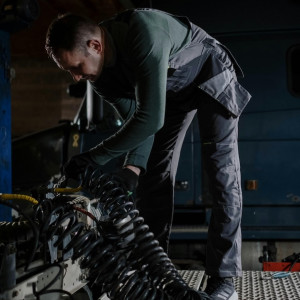How Can Structured Training Influence Technician Retention Rates in Logistics?


Retaining skilled technicians is a challenge for many logistics providers. Structured training plays a key role in addressing this issue. By fostering growth, reducing stress, and building confidence, organised education programmes improve job satisfaction and loyalty.
This article explores how strategic training efforts can positively influence retention rates in the logistics sector.
Providing Clear Growth Paths Through Structured Training
A lack of clear career progression can leave technicians feeling stuck. Structured training programmes help solve this by mapping out development opportunities within the company. When employees see a path for advancement, they are more likely to stay and grow with the organisation.
For example, introducing tiered certifications or skill levels provides tangible goals for workers to achieve. Each milestone represents progress and signals their value to the business. By offering structured growth paths, logistics companies show commitment to their workforce--resulting in stronger retention rates over time.
Fostering Loyalty by Investing in Technician Development
Employees are more likely to remain loyal when they feel valued.
Structured training is an effective way to show technicians that their development matters. Providing education and skill-building opportunities signals long-term investment in their careers. This approach doesn't just improve technical abilities; it also builds trust between employees and the company.
When workers see that resources are spent on their growth, they're less inclined to look elsewhere. By prioritising development, logistics businesses create a sense of loyalty that significantly improves technician retention rates.
Improving Confidence and Competence with Tailored Programmes
Customised training programmes ensure technicians feel confident in their roles. When education aligns directly with job demands, employees become more capable of handling day-to-day challenges.
This competence leads to higher satisfaction, as individuals feel prepared rather than overwhelmed. Programmes like Diesel Mechanic Training Texas highlight how focused learning can develop practical skills suited to industries reliant on well-maintained vehicles. By providing access to specialised courses like these, logistics companies give technicians the tools they need to succeed in their careers.
This kind of targeted support strengthens retention by building both skillsets and confidence.
Reducing Job Stress with Standardised Education Practices
Technicians often face high-pressure situations where precision is crucial. Without proper training, these challenges can lead to stress and burnout. Structured education practices provide clear guidelines and repeatable methods, reducing uncertainty in demanding roles.
By standardising training, companies ensure that employees know exactly how to approach tasks efficiently and safely. This consistency builds confidence while minimising mistakes that could cause frustration. When technicians feel equipped to handle their responsibilities without unnecessary pressure, job satisfaction improves--ultimately decreasing turnover rates within the logistics sector.
Enhancing Problem-Solving Skills to Increase Job Satisfaction
When technicians encounter unexpected challenges, quick and effective solutions are required.
Structured training hones problem-solving abilities by equipping workers with strategies to tackle complex issues confidently. This preparedness leads to greater job satisfaction, as employees feel capable and empowered in their roles. Hands-on learning opportunities or scenario-based exercises are especially valuable.
These methods simulate real-world problems, teaching technicians how to think critically under pressure. By fostering these skills through organised programmes, logistics companies create a more competent workforce--reducing frustration and encouraging long-term commitment from their employees.
Building a Stronger Team Culture with Shared Learning Experiences
Structured training doesn't just improve individual skills; it also strengthens team dynamics. When technicians train together, they build camaraderie and develop a sense of shared purpose.
This collaborative learning environment fosters mutual support, which improves morale across the workforce. Workshops, group projects, or mentorship programmes are effective ways to encourage team-oriented development. These experiences help employees form connections that go beyond daily tasks.
A strong team culture makes workers feel more engaged and valued within the organisation--leading to higher retention rates in logistics companies over time.
Minimising Skill Gaps That Lead to Technician Turnover
Skill gaps can frustrate technicians, leaving them unable to perform tasks efficiently or meet job expectations. Structured training programmes directly address these gaps by providing targeted education in areas where employees need the most support. When technicians feel competent and well-prepared, their confidence grows, and job satisfaction follows.
This proactive approach prevents situations where workers might leave due to feeling overwhelmed or underqualified.
By minimising skill gaps through consistent training efforts, logistics companies create a more capable workforce while significantly improving technician retention rates.